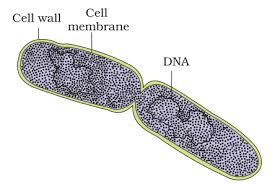Skip to content
Eubacteria
- They are characterized by the presence of a rigid cell wall and a flagellum (if motile).
- They include Autotrophs (photosynthetic and chemosynthetic) and Heterotrophs.
a. Photosynthetic autotrophs (E.g. Cyanobacteria):
- They have chlorophyll-a similar to green plants.
- Cyanobacteria (blue-green algae) are unicellular, colonial or filamentous, marine or terrestrial algae.
- The colonies are generally surrounded by gelatinous sheath.
- They often form blooms in polluted water bodies.
- Some of these can fix atmospheric nitrogen in specialized cells called heterocysts, e.g., Nostoc and Anabaena.
b. Chemosynthetic autotrophs:
- They oxidize various inorganic substances such as nitrates, nitrites and ammonia and use the released energy for their ATP production.
- They play a great role in recycling nutrients like nitrogen, phosphorous, iron and sulphur.
c. Heterotrophic bacteria:
- They are the most abundant in nature.
- The majority are important decomposers.



